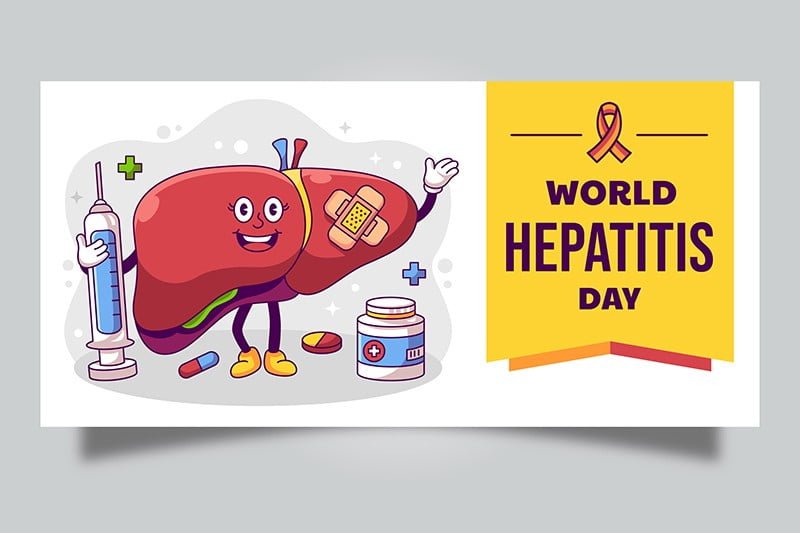In Nigeria, where a health crisis persists beneath the surface, World Hepatitis Day brings into focus the relentless battle against the invisible enemies – Hepatitis B and C.
These silent epidemics wreak havoc on the liver, leading to life-threatening consequences if left undetected.
As the nation commemorates this global event, healthcare experts delve deeper into the enigma of viral hepatitis, shedding light on the challenges and progress made in the quest for better health outcomes.
Hepatitis, a viral infection that attacks the liver, unfolds as a silent threat, claiming lives and causing irreversible damage.
Among the five hepatitis strains, B and C emerge as the most common culprits in Nigeria, stealthily affecting millions, with many unaware of their infections.
According to the 2018 Nigeria AIDS Indicator and Impact Survey (NAIIS) report, hepatitis B prevalence stands at 8.1%, while hepatitis C follows at 1.1%.
Yet, beneath these numbers lie stories of anguish, missed opportunities, and the urgent need for action.
While Nigeria grapples with its own hepatitis burden, the global landscape presents an alarming picture.
The World Health Organization (WHO) estimates that approximately 296 million individuals lived with chronic hepatitis B in 2019, with a staggering 1.5 million new infections reported annually.
Hepatitis B took the lives of around 820,000 people in the same year, emphasizing the pressing global need for comprehensive intervention strategies.
One of Nigeria’s greatest hurdles in the fight against viral hepatitis is the late detection and presentation of cases.
Due to limited awareness and the insidious nature of the infections, many remain oblivious to their condition until irreversible damage has occurred.
Late diagnosis compromises treatment options and leaves healthcare practitioners grappling with challenges in managing advanced cases.
Reducing the prevalence of late-stage presentations calls for intensified education and targeted screening initiatives.
While hepatitis B lacks a cure, preventive measures offer hope in curbing its spread. Vaccination is a powerful tool to protect against the virus, particularly in high-risk individuals.
Experts stress the importance of early detection and vaccination, which significantly reduces the risk of severe complications such as liver cirrhosis and cancer.
However, vaccine availability, affordability, and awareness remain vital components for successful immunization campaigns.
Despite the promise of vaccines, accessibility and affordability remain barriers to widespread immunization.
Disparities in vaccine prices across regions and healthcare facilities contribute to uneven access, leaving some vulnerable to infection.
As Nigeria focuses on vaccinating infants under the Expanded Programme on Immunization (EPI), adults find themselves excluded from routine vaccination.
To enhance overall vaccine uptake, measures to ensure equitable distribution and affordability are paramount.
Empowering communities with knowledge about viral hepatitis forms the bedrock of successful prevention.
Amplifying awareness campaigns, particularly in remote areas where knowledge gaps persist, can empower individuals to seek timely testing and treatment.
Regular screening initiatives serve as crucial steps in capturing early cases, allowing for effective intervention and preventing the progression of the infections.
Addressing viral hepatitis demands collective action and collaboration. Governments, healthcare providers, NGOs, and communities must unite to tackle the silent epidemics.
Strengthening primary healthcare services, increasing vaccine accessibility, and advancing awareness campaigns form the foundation of Nigeria’s fight against these invisible adversaries.
Together, through synergy and commitment, Nigeria can foster a healthier and more resilient society, free from the grip of hepatitis B and C.
As Nigeria observes World Hepatitis Day, the nation confronts the formidable challenges posed by viral hepatitis B and C.
Beyond statistics, there lies the untold story of individuals living with silent epidemics, their struggles, and hopes for better health outcomes.
The path to victory encompasses affordable vaccines, increased awareness, early detection, and a united front against the hidden dangers.
With each step taken, Nigeria moves closer to unravelling the enigma of hepatitis and securing a healthier and brighter future for all its citizens.
As the journey continues, the nation’s resolve strengthens, and the vision of a hepatitis-free Nigeria comes ever closer to reality.


